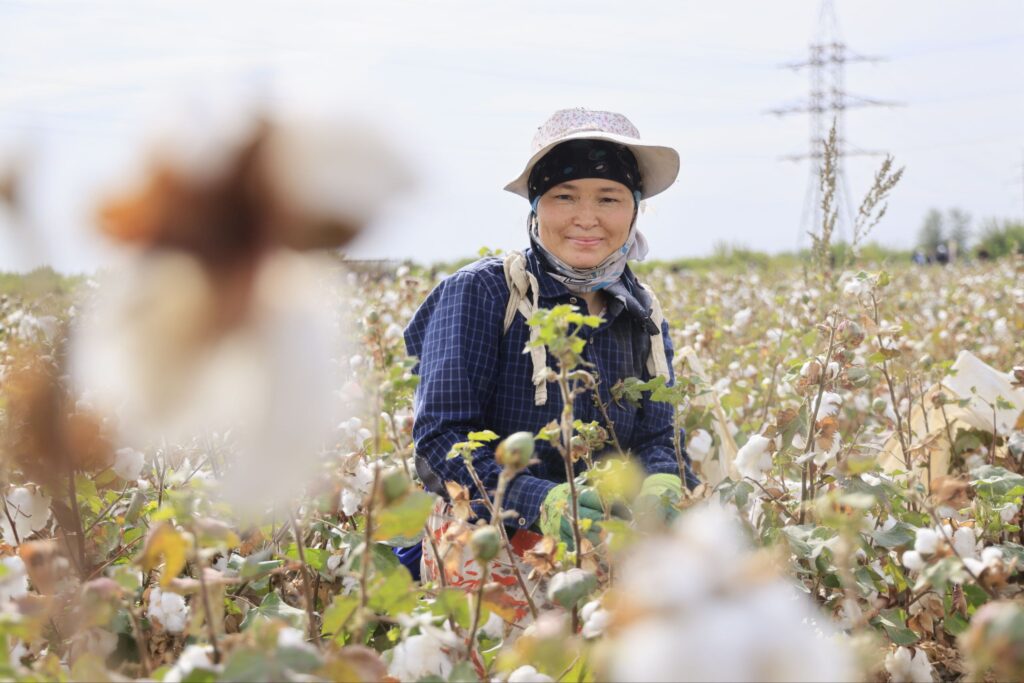

Better Cotton, the world’s largest cotton sustainability initiative, has announced significant progress in the delivery of its Uzbekistan programme, including the adoption of stronger and more refined approaches to due diligence and decent work activities.
Katerina Gorbunova, Head of Better Cotton’s programme in Uzbekistan, said: “In collaboration with our Programme Partner, the German Agency for International Cooperation (GIZ), we have strengthened the programme’s framework and the services we offer to accelerate change across the country’s cotton sector.”
Better Cotton’s Uzbek programme has strengthened in-country verification of licensed clusters by building the capacity of independent civil society groups and third-party auditors, plus implementing an updated due diligence methodology to ensure more robust and local oversight.
This new-and-improved approach includes in-depth interviews and questionnaires with both cluster management and workers. It also consists of checks on financial health, ethics, and governance, providing a more comprehensive view of risk and performance across participating enterprises. The insights generated through this process are used to inform targeted interventions.
Decent work-related actions have also evolved in light of Better Cotton recently becoming a certification scheme. The organisation now conducts preliminary assessments of newly onboarded clusters before the season begins to determine their readiness for certification and if requirements are not met, audits are postponed to the following season.
For clusters with active licences, second party checks by qualified Better Cotton staff are conducted to identify potential decent work-related issues and, if necessary, trigger a more comprehensive examination by external labour rights monitoring organisations.
Since August 2024, Better Cotton and GIZ have expanded training to cover not only innovative and regenerative agricultural practices, but also social sustainability and decent work principles following recent changes to Uzbek labour laws.
This effort deployed a cascading training methodology to target cotton cluster management on the basis that they can subsequently educate workers, who can then support their peers.
Gorbunova said: “The Uzbek cotton sector has tremendous potential to be a leader in the production of more sustainably produced cotton. This can only be achieved through collaboration, robust and transparent processes, and perseverance. Better Cotton is uniquely positioned to help unlock this potential and will continue to engage stakeholders across the country to make our vision a reality.”
Paul Schumacher, Cotton Project Manager at GIZ Uzbekistan, added: “Today, sustainable agricultural methods, trade facilitations and decent work are no longer parallel efforts, they are parts of one sustainable system. With the right networks and shared effort, as we created within the frame of Better Cotton, we turn individual action into systemic change.”
Notes to Editors
- Better Cotton Programme Partners work with farming communities at field level to ensure they are producing cotton that meets the Better Cotton Standard.
- Uzbekistan’s ‘cotton clusters’ are private companies with vertically-integrated production capacities that are awarded land grants on the condition that it is used to produce and process cotton.
- Clusters employ thousands of workers, meaning that a top-down training approach can streamline onboarding and boost staff autonomy.
- Uzbekistan is the sixth largest cotton-producing country in the world.
- In May 2025, Better Cotton published its revised Decent Work 2030 Roadmap.
- Better Cotton completed its transition to become a certification scheme in February 2025. As such, third-party bodies will fulfil decent work monitoring as part of their auditing requirements, supplemented by remaining Better Cotton second-party checks.







































